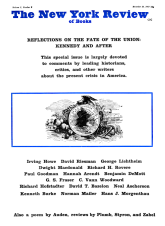In response to:
The Megadeath Intellectuals from the November 14, 1963 issue
To the Editors:
I had, in the middle of last week, prepared a rather lengthy reply to Marcus Raskin’s review of my book, The Arms Debate, in your November 14 issue. In it, I suggested that neither Raskin’s ad hominem attacks on the so-called “defense intellectuals” as individuals who supply opinions for a fee, nor his attempt to substitute a debate over “who paid whom to say what and why” for the reasoned debate over impersonal arms issues which was the subject of my book, are useful contributions to the solutions of real problems.
The letter did not get mailed, and, in the light of last weekend’s events, let me merely suggest instead that if Raskin did not know before why ad hominem argument and conspiracy theory are invalid and hurtful contributions to any political debate, he should know now attacking people rather than ideas substitutes a revolutionary political method in the worse sense for a revolutionary political ideal in the best sense. I think that the concepts of Gandhi and Martin Luther King—vitally important in their own contexts—are not applicable to the complex world of political-military relations, but these are revolutionary ideals and idealists one must respect in any context. Raskin has no major substance contributions to make to foreign policy, however, beyond suggesting the obvious point that in international relations the carrot has its uses as well as the stick. By immersing this idea in personal polemic, he has substituted an attempt to alleviate emotional frustration with a complex world for an attempt to find solutions even in complexity.
Robert A. Levine
Los Angeles
Mr Raskin replies:
I enjoyed Mr. Wohlstetter’s spirited answer, which is in the grand tradition of rhetorical impudence. However, certain points which he raises should not go unchallenged since they concern major questions of political analysis. If a criticism of the logical method of my review is to be made, it is not that it partakes of ad hominem argument but rather that it partakes of the so-called genetic fallacy. More important are Mr. Wohlstetter’s views, which are startling for a supposedly mature man of affairs. Is Mr. Wohlstetter saying that the relationship of ideas to their social, political, and economic context should not be considered? Does he deny any validity to sociology, psychology, or to those basic tools of analysis of the social sciences which are predicated on the relationship of men’s roles, interests, and social situations to their ideas? Does Mr. Wohlstetter think that there is no validity or use to the conflict-of-interest laws and disclosure statutes (indeed, the common law itself), which are predicated on the assumption of the close relationship of what a man thinks and does to his occupation, status, interest, and group?
I did not say that people should not read the works on arms strategy of men like Mr. Wohlstetter. It is only when they do that they will be able to draw their own conclusions about the usefulness and seriousness of such thoughts for solving public problems. I would like to draw the reader’s attention to Mr. Wohlstetter’s article, “The Delicate Balance of Terror,” in the January 1959 issue of Foreign Affairs for a classic example of myth and misreasoning in the face of the facts. (C.f., P.M.S. Blackett’s analysis of Wohlstetter’s pseudo-logic in Studies of War, pp. 128-146.)
Furthermore, one does not have to be an insider as Mr. Wohlstetter thinks he is to note that there is tension between the Rand Corporation, for example, and its employer, the Air Force. This is to be expected. Especially as some of the Rand Corporation’s brightest Schoolmen are now the bosses of the Air Force by virtue of their positions as civilians in key posts in the Defense Department. Beyond that, there is, of course, always tension between the technician and the individual or institution footing the bill. One wants independence, the other service. This rule is true whether it is a Madison Avenue advertising firm servicing a cosmetics company, a Wall Street law firm servicing a bank, a public relations firm servicing a union, or an armed services think factory servicing one of the military branches. Indeed, the value of the endowment system which I recommended for the Rand Corporation and other think factories—on the condition that they become research universities to the society—was that they would not be indebted to particular parochial interests.
Finally, there are facts even in so seemingly subjective an area as national security. No serious debate which has as its purpose the solution of public problems rather than the exacerbation of them, can proceed without recognizing this I agree with Wohlstetter that the only debate that should go on is about substantive issues. But such a debate can only be meaningful when we have full disclosure of the interests of the participants, and have arrived at some understanding of their motivations.
I am saddened by Mr. Levine’s letter. I do not understand what he means, and what he implies is so appalling that I am left with a sense of the importance of exercising self-restraint in my reply. Is Mr. Levine suggesting that the Federal Government should not investigate whether there is anybody behind Mr. Oswald—for example a political group committed to certain ideas and programs of action?
Finally, since Mr. Levine seems to have had such difficulty in assessing the contributions of others on matters of foreign and defense policy, it is easy to understand why he has had trouble assessing my own position in these areas.
This Issue
December 26, 1963



